新编英语教程book2-unit 4
新编实用英语综合教程2-unit4hotelservice教案

Unit 4 Hotel ServicesUnit GoalsWhat you should learn to do1.Book a hotel room and services2.Check in /out at a hotel3.Fill in a reservation form4.Fill in a room reservation cardWhat you should know about1.Hotel services in the USA2.Relative clauseSection I Talking Face to Face1.Imitating Mini-Talks2.Acting out the Tasks3.Studying Email Information on the Internet4.Following Sample Dialogues5.Putting Language to UseSection II Being All Ears1.Learning Sentences for Workplace Communication2.Handling a Dialogue3.Understanding a Short Speech / TalkSection III Trying your Hand1.Practicing Applied Writing2.Writing Sentences and Reviewing GrammarSection IV Maintaining a Sharp EyePassage 1 :Information Related to the Reading Passage1. Kinds of hotels in the United States:Places to stay for a short time may be called hotels, hostels, motels or motor hotels, inns, lodges or resorts. Hostels, also referred to as youth hostels, are often for students working away from home. Motels have plenty of parking space and are usually near a freeway or highway. Inns are usually like motels. Lodges and resorts, or resorts hotels, are in the mountains, on the coast, or near lakes.2. Kinds of beds:Beds go by many different names. Starting with the smallest, there are single, twin, double, queen and king size ones. “Long boys” are for exceptionally tall people. At some hotels, queen beds are the smallest size used, so a double room has two of them. Some hotels even offer their guests waterbeds. A rollaway can be moved into a room to sleep an extra person. Hide-a-beds are sofas that fold out to make beds.Text Welcome to Climer LodgeMiami UniversityOxford, Ohio 45056Welcome to Climer Lodge. We are fortunate to have this beautiful facility to accommodate very special guests from Miami University. In our efforts to serve you, we ask that you note the following:● The resident manager lives in Room 129, near the lobby entrance, and may be reached by dialing 9-5226. Please contact the manager if you have any questions or needs after 5:00 . on weekdays and throughout weekend stays.● On the lower level of Climer you will find an ice machine, a canned beverage machine, a lounge area and kitchenette where coffee and tea anda light continental breakfast are provided.● Lounge Hours:6:00 . to 11:00 . daily. It is a non-smoking atmosphere.● Recreation Center Hours:9:00 . to 10:00 ., Sunday through Thursday. 9:00 . to 11:00 . on Friday and Saturday. No lifeguard is on duty in the swimming pool. Parents are required to be present at all times when children are in the pool. No children are allowed in the sauna.● Check-out time is 10:00 . Upon departure, please leave the key in your room.Phone Instructions:● On-campus calls: Dial only the last 5 numbers. No need to dial the52 prefix.●Local telephone calls: Dial 88, then the 7-digit off-campus number.● AT&T operator-assisted calls (collect, calling card, etc.) —dial 80, the area code(for all long distance calls), then the telephone number.To place an international call: Dial 8+011+Country Code+City Code+Number●EMERGENCY PHONE NUMBER: PUBLIC SAFETY —911 (Police, Fire, Medical)Language Points1 Explanation of Difficult Sentences1. (Para. 1) We are fortunate to have this beautiful facility to accommodate very special guests of Miami University.Analysis: In this sentence the infinitive phrase to have this beautiful facility ...is used as an adverbial of reason, modifying are fortunate.Translation: 我们很荣幸为迈阿密大学尊贵的客人们提供优美的住宿条件。
(完整word版)新编英语教程book2-unit4

Unit 4Teaching objectives:1. To learn the main language structures (relative clause);2. To build language skills through dialogue and listening in & speaking out;3. To explore the theme of the text;4. To learn the key words and expressions;5. To appreciate the writing features of the text;6. To apply some reading skills to practice;7. To think critically about the theme.Teaching focuses:1. The relative clauses introduced by relative adverbs: when, where, why;2. Key words and expressions;3. Appreciation of the text.Teaching approaches:1. Task-Based Language Teaching;2. Student-Centered Class;3. Learning by Using.Time allocation:Language Structures (2 periods)Dialogue (2 periods)Listening in & speaking out (1 period)Reading 1 (4 periods)Reading 2 (2 periods)Guided writing (1 period)Workbook (2 periods)Teaching procedures:Part 1 Language structuresStep 1 Ask students to read the four sentences and try to find out the grammar point -----relative clauses introduced by relative adverbs: when, where, whyStep 2 Analyze the following sentences one by one and find out the focus of each sentence:1.12 October 1492 was the day when Columbus landed in America.The relative clause introduced by when2. A kitchenette is a small room where people cook their meals.The relative clause introduced by where3.I like the way she spoke.The relative clause preceded by the way (in which)4.Is that the reason why we have tests and quizzes all the time?The relative clause introduced by whyStep 3 Explanations of grammar points1. 关系副词or 关系代词先行词是表示时间或地点的名词时,并不都是用关系副词引导,而是要看关系词在从句中所作的成份。
必修2 Book II Unit4 Warm up PPT课件

The problem the pandas face in China is that they do not have enough food because of the loss of bamboo growing areas.To solve this problem, China has set up a protection zone in Sichuan Province for the pandas.It is called Wolong Nature Reserve.Thanks to the effort, things have changed for the better.The number of pandas has risen from very few to around 70 after the growth of bamboo areas for the pandas.
great increase in number and several Milu Present situation deer centres have been set up an increase in the friendship between China Value of the and Britain cooperation
Let's leave our children a living planet.
1.What problems are some wild animals in China facing?
2.What has China done to solve the problem?
3.How have things changed since China took action to protect wild animals?
book2 unit4教案
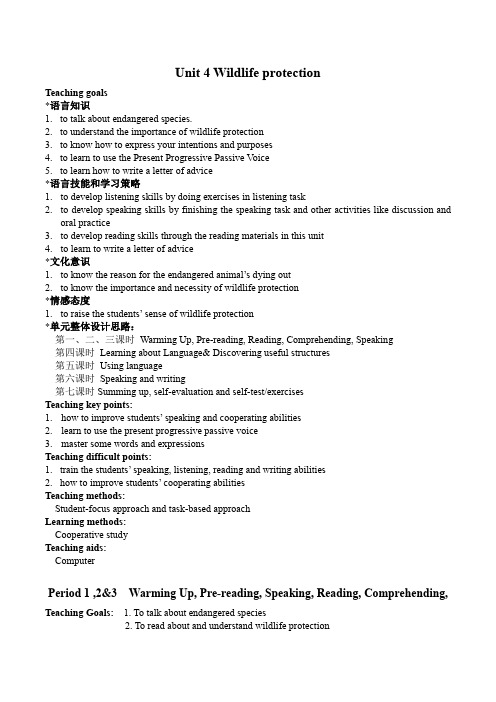
Unit 4 Wildlife protectionTeaching goals*语言知识1.to talk about endangered species.2.to understand the importance of wildlife protection3.to know how to express your intentions and purposes4.to learn to use the Present Progressive Passive V oice5.to learn how to write a letter of advice*语言技能和学习策略1.to develop listening skills by doing exercises in listening task2.to develop speaking skills by finishing the speaking task and other activities like discussion andoral practice3.to develop reading skills through the reading materials in this unit4.to learn to write a letter of advice*文化意识1.to know the reason for the endangered animal’s dying out2.to know the importance and necessity of wildlife protection*情感态度1.to raise the students’ sense of wildlife protection*单元整体设计思路:第一、二、三课时Warming Up, Pre-reading, Reading, Comprehending, Speaking第四课时Learning about Language& Discovering useful structures第五课时Using language第六课时Speaking and writing第七课时Summing up, self-evaluation and self-test/exercisesTeaching key points:1.how to improve students’ speaking and cooperating abilities2.learn to use the present progressive passive voice3.master some words and expressionsTeaching difficult points:1.train the students’ speaking, listening, reading and writing abilities2.how t o improve students’ cooperating abilitiesTeaching methods:Student-focus approach and task-based approachLearning methods:Cooperative studyTeaching aids:ComputerPeriod 1 ,2&3 Warming Up, Pre-reading, Speaking, Reading, Comprehending, Teaching Goals: 1. To talk about endangered species2. To read about and understand wildlife protectionTeaching Procedures:Step 1. Lead-inShow some pictures of some endangered animals and let the students name them. (polar bear, milu deer, rhino, tiger, crocodile, leopard, koala, panda, dolphin, giraffe…)Questions: 1. Do you often see these animals?2. What problems are some animals facing nowadays? Why?Step 2. Warming up& SpeakingCooperative learning: discuss the questions with the partners.1. Why are the animals in danger?(1. Don’t have enough food; 2. Being hunted and killed ; 3. The bad environment; )2. What measures should be taken to protect the endangered animals?((1) Treat the animals as our friends; (2) We shouldn’t kill them freely. (3) We should protect the environment around us. (4) We should collect money to protect animals. (5)Protect their habitats and create new ones (6)S top buying clothes made of their furs …)Step 3. ReadingTask 1: Scanning1. What three places has she been to?2. What problems face the animals?3. What endangered animals are they?Task 2: Skimming1. Read the passage carefully and fill in the chart on page 27.2. Answer the questions. (P27)Task 3: Listen and read aloud.Step 4 SummaryFill in the blanks.How Daisy Learn to Help Wildlife1.Tibet: (1) ___________ is used to make sweater.(2) Antelopes are killed for ________;(3) Every year over ___________ antelopes are killed.2.Zimbabwe; (1) ________ used to hunt the elephants.(2) Now farmers __________ them.3.Rainforest: (1) A ________ insect affects mosquitoes.(2) No ______, no ________ and no _________.Step 5 Language points1.protection n. 保护protect vt. ~sth. from/against…保护……避免……He’s wearing the sunglasses to protect his eyes from/against the strong sunshine.2.die out灭亡;逐渐消失Many animals have died out in the past decades.*die away 慢慢减弱直至消失, die of/from 死于, die off 一个接一个死去3.loss n.His death is a loss of our country.The earthquake caused a loss of more than 20,000,000 yuan.*at a loss不知所措I’m at a loss what to do?4. Daisy had always longed to help endangered species of wildlife.(L1,P26)戴西一直想要帮助濒危动物.long: v. 渴望、非常想long to do 渴望做某事, long for …渴望……The children are longing to see you again. 孩子们盼望再见到你。
新视野大学英语第三版读写教程-Book2-Unit4-SectionA-课后练习答案
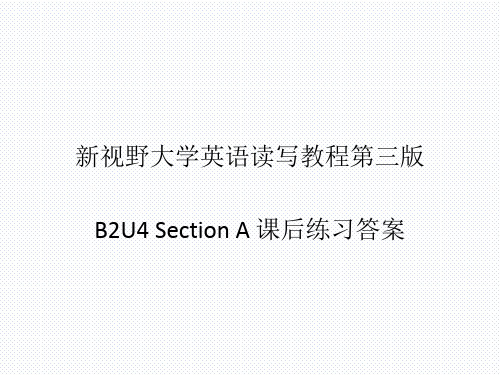
Structured writing P101
At the beginning of the semester, my English teacher gave the assignment of speaking for three minutes in front of the class. It was an individual project worth 10 percent of the course grade. Since I was very nervous to speak in public, I worried about it for two months. Having no choice, I wrote all of my ideas on note cards. I practiced my speech with my notes in front of a mirror and in front of my dog. Would I be able to give my speech in front of my class?
Critical thinking P95
3 • Try everything I can to secure it. • Interact and communicate with my date frankly. • Figure out what the problem is and then try to solve it. • Don't care since it's useless if my date is not interested in me anymore. 4 • Responsible, smart, honest, considerate, understanding, diligent, rich, good-looking, funny, having the same interest. 5 • Appearance, because I like to see someone who is good-looking. • Character, because appearance will change as time goes by, while one's character is essential to marriage.
新编英语教程2UnitFourJune

Vocabulary
Deteriorate technological Assail( attack sb violently and repeatedly) Mobcide Countermeasure bronchial Be fouled up with ( make sth dirty)
technological progress? 2. What is happening in the countryside as far
as ecology is concerned? 3. What measures has the U.K taken to
preserve the environment?
actions) 7. Must have done ( affirmative deduction about past actions)
8. 2. Practice the sentence patterns using the cues on Page.46 Why Longer Life Expectancy?
Difficulty
• Comprehension of Reading I • Awareness of environmental protection
Step One Structures
1. Introduce the structures 2. Would have done ( unfulfilled wish) 3. Should/ought to have done (unfulfilled obligation) 4. Needn’t have done ( unnecessary past action) 5. May/ might have done ( speculations about past actions) 6. Can’t/couldn’t have done ( negative deduction about past
全新版大学英语 book 2 unit 4 the virtual world
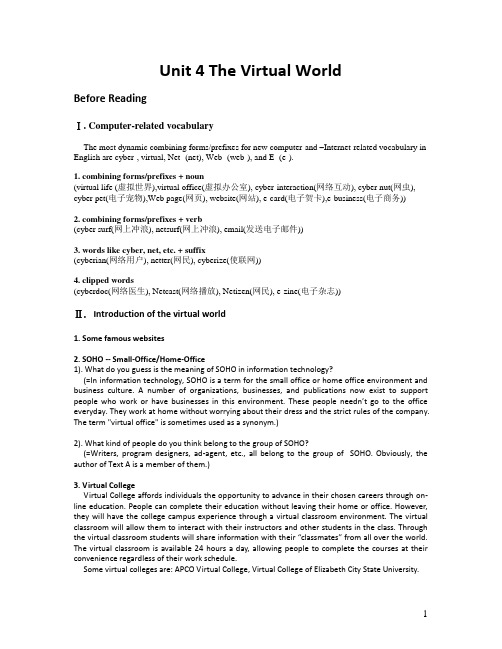
Unit 4 The Virtual WorldBefore ReadingⅠ. Computer-related vocabularyThe most dynamic combining forms/prefixes for new computer-and –Internet-related vocabulary in English are cyber-, virtual, Net- (net), Web- (web-), and E- (e-).1. combining forms/prefixes + noun(virtual life (虚拟世界),virtual office(虚拟办公室), cyber-interaction(网络互动), cyber nut(网虫), cyber pet(电子宠物),Web page(网页), website(网站), e-card(电子贺卡),e-business(电子商务))2. combining forms/prefixes + verb(cyber surf(网上冲浪), netsurf(网上冲浪), email(发送电子邮件))3. words like cyber, net, etc. + suffix(cyberian(网络用户), netter(网民), cyberize(使联网))4. clipped words(cyberdoc(网络医生), Netcast(网络播放), Netizen(网民), e-zine(电子杂志))Ⅱ. Introduction of the virtual world1. Some famous websites2. SOHO -- Small-Office/Home-Office1). What do you guess is the meaning of SOHO in information technology?(=In information technology, SOHO is a term for the small office or home office environment and business culture. A number of organizations, businesses, and publications now exist to support people who work or have businesses in this environment. These people needn’t go to the office everyday. They work at home without worrying about their dress and the strict rules of the company. The term "virtual office" is sometimes used as a synonym.)2). What kind of people do you think belong to the group of SOHO?(=Writers, program designers, ad-agent, etc., all belong to the group of SOHO. Obviously, the author of Text A is a member of them.)3. Virtual CollegeVirtual College affords individuals the opportunity to advance in their chosen careers through on-line education. People can complete their education without leaving their home or office. However, they will have the college campus experience through a virtual classroom environment. The virtual classroom will allow them to interact with their instructors and other students in the class. Through the virtual classroom students will share information with their “classmates” from all over the world. The virtual classroom is available 24 hours a day, allowing people to complete the courses at their convenience regardless of their work schedule.Some virtual colleges are: APCO Virtual College, Virtual College of Elizabeth City State University.Questions and Answers to Virtual College:1.Do you think virtual college will be popular in the future, why or why not?(=Open-ended.)2.What do you think are the advantages and disadvantages of virtual college?(=Open-ended.)Ⅲ. News Report(Direction:) Listen to the following news and answer the questions.1. Why were e-communications booming when the deadly SARS virus was plaguing?(=Because people want to reduce their face-to-face contacts with others, or hide at home.)2. What did people surf the Net for during the period of SARS plaguing?(=They surf the Net for information about SARS and use e-mail to keep in touch with friends and family; share the information and downloading medical advice.)3. What did you do when SARS was plaguing?(=Open-ended.)Ⅳ. Warm-up Questions1.What are the antonyms of “virtual world” and “virtual life”?(= real world; real life)2.What are the synonyms for “virtual would”?(= cyberspace; cyberia; etherworld; virtual reality; Internet world; net world; etc.)3.What can people do on the Internet?(= communicating with people; shopping; reading; learning; working; publishing; listening to the music; watching films; playing games; hacking; etc.)4.What do you usually do on the Internet, and what websites do you usually log on?(= Open-ended.)Global ReadingⅡ. Questions about the Text1. What is the main idea of Text A?(=Despite the many negative effects of virtual life, the author prefers it to real life.)2. What are the roles of the first paragraph and the last?(=The first paragraph tells about the consequences of living a virtual life and the last tells about the author’s return to it. Together, they show us the dilemma people are in at present : Because of modern technology, we have a choice between a virtual life and real life, but we find both unsatisfactory. The author, however, finally has to choose the latter despite its negative effects.) 3. Word Scanning(Direction:) Scan Text A to find out vocabulary items related to computer and the Internet.Virtual life, on the net, telecommuter, email, internet mailing lists, computer-assisted, data, link, cyber-interaction, on line, system crash, click on the modem, connection, passwordⅢ. Further UnderstandingFor Part Iⅰ. Questions and Answers1. What did the author do three years ago and what is she doing now?(=She had worked as a television producer, and now she submit articles and edit them via email and communicate with colleagues on Internet mailing lists.)2. How does the author manage her daily life?(=She can order food, manage her money, love and work on net.)ⅱ. Difficult SentencesMy boyfriend’s Liverpool accent suddenly becomes impossible to interpret after his easily understood words on screen: a secretary’s clipped tone seems more rejecting than I’d imagined it would be.What does the sentence imply?(=I have become more familiar with the virtual world than the real world.)ⅲ. Words and Expressions1.virtual: adj.1) created and existing only in a computer*I can visit a virtual store and put what I want in my basket at the click of a mouse button.2) almost what is stated; in fact though not in name*国王处处都受王后的影响,以至于王后成了国家实际上的统治者。
新编英语教程第二册_ 单词表Unit4
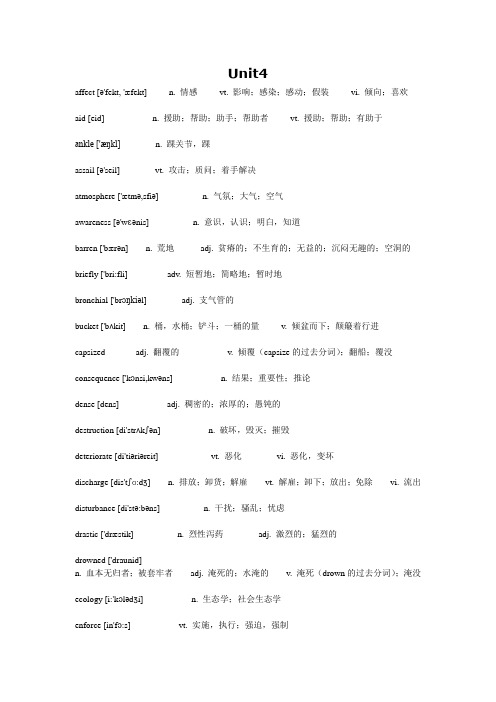
Unit4affect [ə'fekt, 'æfekt] n. 情感vt. 影响;感染;感动;假装vi. 倾向;喜欢aid [eid] n. 援助;帮助;助手;帮助者vt. 援助;帮助;有助于ankle ['æŋkl]n. 踝关节,踝assail [ə'seil] vt. 攻击;质问;着手解决atmosphere ['ætmə,sfiə] n. 气氛;大气;空气awareness [ə'wɛənis] n. 意识,认识;明白,知道barren ['bærən] n. 荒地adj. 贫瘠的;不生育的;无益的;沉闷无趣的;空洞的briefly ['bri:fli] adv. 短暂地;简略地;暂时地bronchial ['brɔŋkiəl] adj. 支气管的bucket ['bʌkit] n. 桶,水桶;铲斗;一桶的量v. 倾盆而下;颠簸着行进capsized adj. 翻覆的v. 倾覆(capsize的过去分词);翻船;覆没consequence ['kɔnsi,kwəns] n. 结果;重要性;推论dense [dens] adj. 稠密的;浓厚的;愚钝的destruction [di'strʌkʃən] n. 破坏,毁灭;摧毁deteriorate [di'tiəriəreit] vt. 恶化vi. 恶化,变坏discharge [dis'tʃɑ:dʒ] n. 排放;卸货;解雇vt. 解雇;卸下;放出;免除vi. 流出disturbance [di'stə:bəns] n. 干扰;骚乱;忧虑drastic ['dræstik] n. 烈性泻药adj. 激烈的;猛烈的drowned ['draunid]n. 血本无归者;被套牢者adj. 淹死的;水淹的v. 淹死(drown的过去分词);淹没ecology [i:'kɔlədʒi] n. 生态学;社会生态学enforce [in'fɔ:s] vt. 实施,执行;强迫,强制erosion [i'rəuʒən] n. 侵蚀,腐蚀exhaust [iɡ'zɔ:st] n. 排气;废气;排气装置vt. 排出;耗尽;使精疲力尽;彻底探讨eyesight ['aisait] n. 视力;目力fell [fel]n. [林] 一季所伐的木材;折缝;兽皮adj. 凶猛的;毁灭性的v. 掉下;摔倒;下垂;变坏(fall的过去式)vt. 砍伐;打倒;击倒fertilizer ['fə:tilaizə] n. [肥料] 肥料;受精媒介物;促进发展者flare [flεə] n. 闪光,闪耀;耀斑;爆发;照明弹vi. 闪耀,闪光;燃烧;突然发怒foul [faul]n. 犯规;缠绕adj. 犯规的;邪恶的;污秽的;淤塞的vt. 犯规;弄脏;淤塞;缠住,妨害adv. 违反规则地,不正当地frightening ['fraitəniŋ]adj. 令人恐惧的;引起突然惊恐的fume [fju:m] n. 烟;愤怒,烦恼vt. 熏;冒烟;愤怒地说handout ['hændaut] n. 散发材料(免费发给);上课老师发的印刷品;文字资料;施舍物horn [hɔ:n] n. 喇叭,号角;角vt. 装角于increasingly [in'kri:siŋli]adv. 越来越多地;渐增地indiscriminate [,indis'kriminət] adj. 任意的;无差别的;不分皂白的industrial [in'dʌstriəl] adj. 工业的,产业的;从事工业的;供工业用的;来自勤劳的insecticide [in'sektisaid] n. 杀虫剂intolerable [in'tɔlərəbl] adj. 无法忍受的;难耐的irritated ['iriteitid] adj. 恼怒的,生气的v. 激怒;使无效;使兴奋(irritate的过去分词)jet [dʒet] n. 喷射,喷嘴;喷气式飞机;黑玉adj. 墨黑的vi. 射出;junk [dʒʌŋk]n. 垃圾,废物;舢板leaking [li:kiŋ]n. 漏泄,渗漏;耗散adj. 渗漏的v.泄露(leak的ing形式)lessen ['lesən] vt. 使变小;使减轻;使变少vi. 减少;减轻;变小major ['meidʒə]n.成年人;主修科目;陆军少校adj. 主要的;重要的;主修的;较多的vi. 主修marine [mə'ri:n]n. 海运业;舰队;水兵;(海军)士兵或军官adj. 船舶的;海生的;海产的;航海的marvellously ['ma:vələsli] adv. 不可思议地;绝妙地;不平凡地;很好地ministry ['ministri] n. (政府的)部门mobility [məu'biləti] n. 移动性;机动性;[电子] 迁移率nuisance ['nju:səns] n. 讨厌的人;损害;麻烦事;讨厌的东西panic ['pænik] n. 恐慌,惊慌;大恐慌adj. 恐慌的;没有理由的vt. 使恐慌pesticide ['pestisaid] n. 杀虫剂pollutant [pə'lu:tnt] n. 污染物quiz [kwiz] n. 考查;恶作剧;课堂测验vt. 挖苦;张望;对进行测验residential [,rezi'denʃəl] adj. 住宅的;与居住有关的residue ['rezidju:,-du:] n. 残渣;剩余;滤渣restriction [ri'strikʃən] n. 限制;约束;束缚sail [seil] n. 帆,篷;航行vt. 航行vi. 航行;启航,开船sailing ['seiliŋ]n. 航行;启航;航海术v. 航行,起航(sail的现在分词形式)scatter ['skætə] n. 分散;散播,撒播vi. 分散,散开;散射smog [smɔɡ, smɔ:ɡ] n. 烟雾smokeless ['sməuklis] adj. 无烟的sprain [sprein] n. 扭伤vt. 扭伤surrounding [sə'raundiŋ]n. 环境,周围的事物adj. 周围的,附近的survival [sə'vaivəl] n. 幸存,残存;幸存者,残存物swarm [swɔ:m] n. 蜂群;一大群vt. 挤满;爬vi. 挤满;成群浮游;云集torment [tɔ:'ment, 'tɔ:m-] n. 痛苦,苦恼;痛苦的根源vt. 折磨,使痛苦;纠缠,作弄toxic ['tɔksik] adj. 有毒的;中毒的ugliness ['ʌglinis] n. 丑陋,丑陋之物unfulfilled [,ʌnful'fild] adj. 未得到满足的;没有成就感的whereabout ['hwεərə,baut] n. 行踪;下落adv. 在何处zone [zəun] n. 地带;地区;vt. 使分成地带;环绕vi. 分成区。
全新版大学英语综合教程第二册第四单元课后练习答案unit 4 book 2
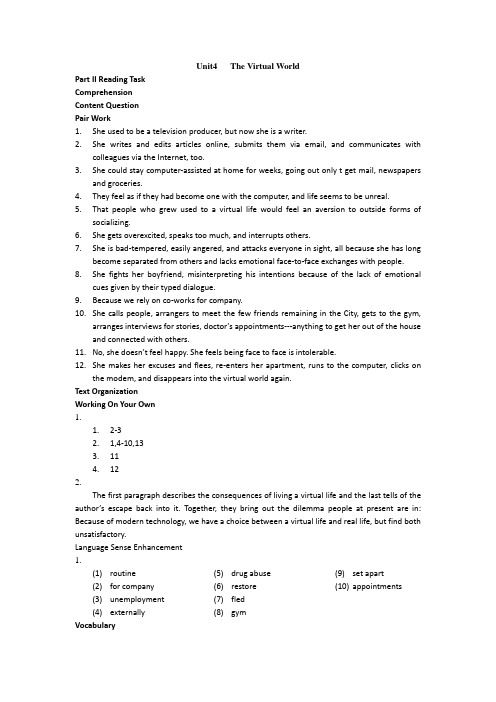
Unit4 The Virtual WorldPart II Reading TaskComprehensionContent QuestionPair Work1.She used to be a television producer, but now she is a writer.2.She writes and edits articles online, submits them via email, and communicates withcolleagues via the Internet, too.3.She could stay computer-assisted at home for weeks, going out only t get mail, newspapersand groceries.4.They feel as if they had become one with the computer, and life seems to be unreal.5.That people who grew used to a virtual life would feel an aversion to outside forms ofsocializing.6.She gets overexcited, speaks too much, and interrupts others.7.She is bad-tempered, easily angered, and attacks everyone in sight, all because she has longbecome separated from others and lacks emotional face-to-face exchanges with people.8.She fights her boyfriend, misinterpreting his intentions because of the lack of emotionalcues given by their typed dialogue.9.Because we rely on co-works for company.10.She calls people, arrangers to meet the few friends remaining in the City, gets to the gym,arranges interviews for stories, doctor’s appointments---anything to get her out of the house and connected with others.11.No, she doesn’t feel happy. She feels being face to face is intolerable.12.She makes her excuses and flees, re-enters her apartment, runs to the computer, clicks onthe modem, and disappears into the virtual world again.Text OrganizationWorking On Your Own1.1.2-32.1,4-10,133.114.122.The first paragraph describes the consequences of living a virtual life and the last tells of the author’s escape back into it. Together, they bring out the dilemma people at present are in: Because of modern technology, we have a choice between a virtual life and real life, but find both unsatisfactory.Language Sense Enhancement1.(1)routine(2)for company(3)unemployment(4)externally (5)drug abuse(6)restore(7)fled(8)gym(9)set apart(10)appointmentsVocabularyI 1.1)conversely2)but then3)symptom4)spitting 5)abusing6)tone7)took; in8)editing9)have arranged10)in sight11)stretched12)data2.1)smoking cigarettes jars on me.2)find themselves getting sucked in.3)has arranged for a technician from the computer store to check and repair it.4)fled their country to avoid military service/fled to other countries to avoid militaryservice.5)restore people’s confidence in it.3.1)the virtual; on line; via2)nightmare; routine; any appointment; arrange for3)cue; remarks; his tuneI.Collocation1.We came here all the way on foot.2.Private cars are not allowed on campus.3.They are on vacation in Florida.4.Mary has been talking to her friend on the phone for an hour.5.Don’t worry, Lucy is always on time.6.Industrial demand on fuel is on the rise.age1.hard2.difficult3.impossible4.tough5.hard6.easyprehensive Exercises IV.cloze1.(1)Internet(2)click(3)virtual(4)routines(5)arrange(6)nightmare (7)annoying(8)connection(9)crawls(10)take in(11)spit(12)data(13)sucked into(14)At times(15)flee(16)on line2.(1)companion(2)deliver(3)access(4)enables(5)customers(6)delights(7)provides (8)small(9)remote(10)informationV.Translation1.1)Research shows that laughter can bring a lot of health benefits.2) A show Internet connection speed is really annoying.3)As the law stands, helping someone commit suicide is a crime.4)In her report, Mary tries to interpret the data from a completely different angle.5)Sue is a girl of great talent. Her amazing memory sets her apart from her classmates. 2.Perhaps you envy me for being able to work from home on the computer. I agree that the Internet has made my job a lot easier. I can write, submit and edit articles via email, chat with my colleagues on line and discuss work with my boss. With a click of the mouse, I can get all the data I need and keep up with the latest news. But then, communicating through the Net can be frustrating at times. The system may crash. Worse still, without the emotional cues of face-to-face communication, the typed words sometimes seem difficult to interpret.。
Book II Unit 4
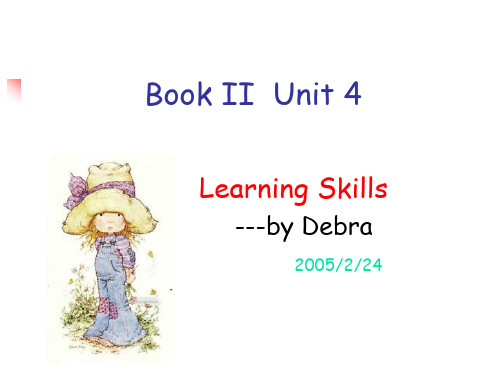
6) Develop a good attitude about tests. The purpose of a test is to show what you have learned a subject. Tests provide grades, but they also let you know what you need to spend more time studying.
2). to cover to cover: place one thing over eg: Cover the table with a table cloth. Cover the sleeping child with your coat. to cover: travel a certain distance eg: He covered the distance in 15 minutes. The car covered 200 miles a day. to cover: (of money) be enough for eg:This check doesn’t cover my expenses.
Will $ 10 cover the co include; consist of eg: This dictionary doesn’t cover the whole of the English vocabulary. This discussion covered a wide range of subjects. to cover: have a size eg: The city covered ten square miles. The recorded history covers a period of five thousand years.
上外全新版大学英语综合教程讲义-book2-unit4
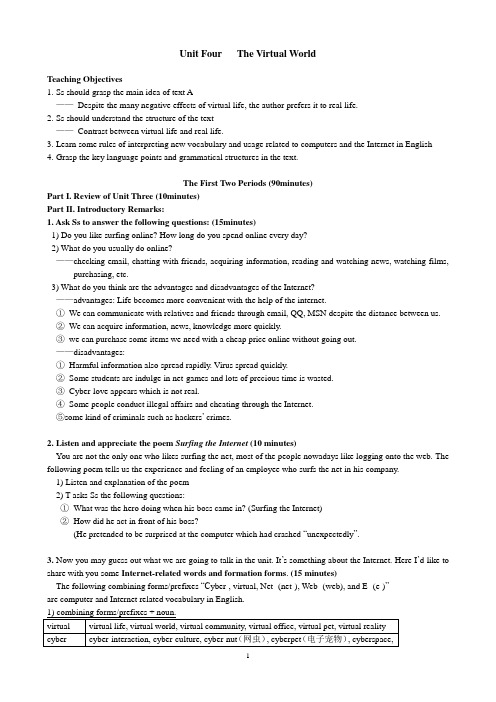
Unit Four The Virtual WorldTeaching Objectives1. Ss should grasp the main idea of text A——Despite the many negative effects of virtual life, the author prefers it to real life.2. Ss should understand the structure of the text——Contrast between virtual life and real life.3. Learn some rules of interpreting new vocabulary and usage related to computers and the Internet in English4. Grasp the key language points and grammatical structures in the text.The First Two Periods (90minutes)Part I. Review of Unit Three (10minutes)Part II. Introductory Remarks:1. Ask Ss to answer the following questions: (15minutes)1) Do you like surfing online? How long do you spend online every day?2) What do you usually do online?——checking email, chatting with friends, acquiring information, reading and watching news, watching films, purchasing, etc.3) What do you think are the advantages and disadvantages of the Internet?——advantages: Life becomes more convenient with the help of the internet.①We can communicate with relatives and friends through email, QQ, MSN despite the distance between us.②We can acquire information, news, knowledge more quickly.③we can purchase some items we need with a cheap price online without going out.——disadvantages:①Harmful information also spread rapidly. Virus spread quickly.②Some students are indulge in net-games and lots of precious time is wasted.③Cyber-love appears which is not real.④Some people conduct illegal affairs and cheating through the Internet.⑤some kind of criminals such as hackers’ crimes.2. Listen and appreciate the poem Surfing the Internet(10 minutes)You are not the only one who likes surfing the net, most of the people nowadays like logging onto the web. The following poem tells us the experience and feeling of an employee who surfs the net in his company.1) Listen and explanation of the poem2) T asks Ss the following questions:①What was the hero doing when his boss came in? (Surfing the Internet)②How did he act in front of his boss?(He pretended to be surprised at the computer which had crashed “unexpectedly”.3. Now you may guess out what we are going to talk in the unit. It’s something about the Internet. Here I’d like to share with you some Internet-related words and formation forms. (15 minutes)The following combining forms/prefixes “C yber-, virtual, Net- (net-), Web- (web), and E- (e-)”are computer and Internet related vocabulary in English.2) combining forms/prefixes + verb.Cybersurf (网络漫游), netsurf (网络漫游), websurf (网络漫游), email (发送电子邮件)3) “cyber”, “net”, etc. + suffix.cyberian (cyber+ian, 网络用户), cyberphobia (cyber+phobia, 电脑恐惧症),cybernaut (cyber+naut, 网络用户), cyberize (cyber+ize, 使联网),webify (web+fy, 使万维化), netter (net+er, 网民)4) Clipped words.Cyberdoc (cyber+doctor, 网络医生), netcast (net+broadcast,网络播放),netiquette (net+etiquette, 网规), netizen (net+citizen, 网民),netpreneur (net+entrepreneur, 网络企业家), webcam (web+camera, 网络摄像机), webliography (web+bibliography, 网络书目), webnomics (web+economics, 网络经济),webzine (web+magazine, 网络杂志), e-tailing (electronic+retailing, 电子零售),e-zine (electronic+magazine, 电子杂志).Part III. Detailed Study of Text A1. Leading in (2 minutes)As we have discussed just now, the Internet has its advantages and disadvantages. Some people think that the world Internet brings to us is not real, as the title of the Unit suggest, it’s a virtual world. Some of us like to live a life in contact with real things and real people, but others favor a virtual existence. Which life is better? I’m sure you have different opinions. Now let’s read Text A to find out what Maia Szalavitz has to say about these two life styles.2. Text Organization (15 minutes)Step one: Let students read the text quickly and try to find the answer to the following questions.1) How does the author manage her daily life?2) How does the author behave when she is suddenly confronted with real live humans?3) What does the author do to restore balance to her life?4) Does the author feel happy when she returns to the real world? Why and why not?Step two: T draws Ss’ attention to divide the text into four parts with reference to Text Organization 1 in page 107.Structure:Part 1: paras 2-3 description of the author’s virtual lifePart 2: paras1, 4-10, 13 how she feels about it after staying on the Net for a whilePart 3: para 11 what she does to return to the real worldPart4: para 12 how she feels about the real worldThe first paragraph tells about the consequences of living a virtual life and the last tells about the author’s return to it. Together, they show us the dilemma people are in: because of modern technology, we have a choice between a virtual life and real life, but we find both unsatisfactory. The author, however, finally has to choose the latter despite its negative effects.3. Cultural notes (see reference book)4. Analysis of the Text in Detaili) Analysis of Paragraph 1 (15 minutes)Step one:Ask Ss to read paragraph 1 and answer the following question:The author tells us that “after too long on the Net, even a phone call can be a shock”, How does shesupport the point in the following sentences?——My boyfriend’s accent, secretary’s clipped tone.Step two: paraphrase1) My boyfriend’s Liverpool accent suddenly becomes impossible to interpret after his easily understoodwords on screen.——After long time of reading his words on screen, it’s impossible for me to interpret his Liverpool accent all of a sudden.Attention: Adjectives followed by an infinitive active in form but passive in meaning.Adjectives like easy, hard, impossible, difficult and tough could be followed by an infinitive which is active in form but passive in meaning.(Refer to page 113, exercise III)…becomes impossible to interpret. = …becomes impossible to be interpreted.Step three: Language points1) virtual2) interpret: distinguish interpret and translate3) clipped: pronounce clearly 发音清楚的4) tone: distinguish tone (语气语调) and accent (口音)She took an angry tone with the reporters. 她带着怒气与记者说话He has an American accent. 他说话带美国口音5) rejecting: make other rejectreject: To refuse to accept, submit to, believe, or make use of.拒绝:拒绝接受,屈服,相信或使用e.g. reject an offer of help拒绝别人提供的帮助6) stretch: (cause to) become longer, wider, etc. without breakingstretch one's legs: 伸长腿; 出去遛遛stretch out a helping hand: 伸出一只援助的手stretch every nerve to do sth.: 全神贯注地做某事7) highlight: An especially significant or interesting detail or event.最重要的或最有趣的细节或事件5. Homework: preview the rest part of the text (7minutes)1) Try to summarize the author’s feeling and behavior after long time on the net.2) Find out what does the author do to restore balance to her life?The Second Two Periods (90 minutes)1. Review (10 minutes)1) Please tell us the some prefixes and combining forms related to the Internet and computer. And cite some examples.2) Translate the following sentences①My boyfriend’s Liverpool accent suddenly becomes impossible to interpret after his easily woods onscreen.显示屏上看惯了我男朋友那些一目了然的文字,他的利物浦口音一下子变得难以听懂。
高教社新编商务英语第二版综合教程2 Unit4

6
Unit 4 Consumer Satisfaction
Teaching Aim 1. Cognitive Information(认知信息): Consumer Satisfaction 2. Language Focus(内容重点) — Key Words: I. bargain, trick, extort, silly, innocent, novelty, whereupon, rush, breathtaking, impertinence, plead, outrage, sane, trifle, extravagant, loo, sticky; II. persuade, rational, checkout, counter, thought-out, vulnerable, economy, dependability, convenience, rock(music), nutritious, package, intelligent — Phrases: I. to start with, might as well, for the sake of, in one’s defense, as though, for one’s life time, pile up, fall for, serve sb. right, all the same; II. go beyond sth., at other times, for pleasure
offered by the business b. compare the products and services offered by the business with those of others c. participate in the advertising campaign launched by the business d. None of the above.
新编大学英语Book2Unit4Part_2B
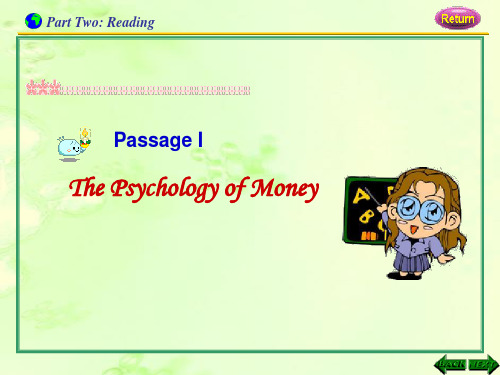
an important symbol of strength and influence;
a symbol of love; only a tool to make our life happier…
To be continued
Part Two: After-Class Reading >> Passage I
To be continued
Part Two: After-Class Reading >> Passage I
Part Three
(Para.6)
Psychologists often use a method called “behavior therapy” to help people who feel that they have problems with money.
To be continued
Part Two: After-Class Reading >> Passage I
5) How do the psychologists usually do to help people who feel that they have problems with money? They often use a method called “behavior therapy”.
habits not only show our beliefs and values, but can also stem from past problems.
Part Two
Para.2
(Para.2-5)
e. Money is an important symbol of strength, influence and love.
新编英语教程第二册Unit4课件
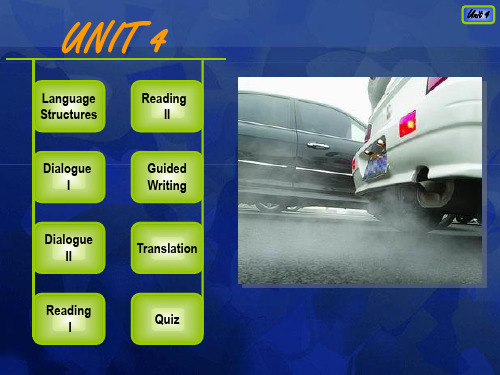
may / might + perfect infinitive indicating “speculations about past actions” Use the structure to make sentence following the given cues. ① Where is Susan? I want to go to the canteen with her. She may / might have gone there already.
Unit 4
She needn’t have learned all the dialogues by heart.
needn’t + perfect infinitive expressing “unnecessary past actions” Use the structure to make sentence following the given cues. ① I wrote a summary in more than five hundred words. But the teacher only asked for 200 words. I needn’t have written such a long summary.
Unit 4
1. I would have liked to sign up, but I sprained my ankle. would + perfect infinitive to expressing “unfulfilled wish” Use the structure to make sentence following the given cues. ① I intend to go skating with you yesterday but I couldn’t because my mother didn’t let me. I would have liked to go skating with you yesterday, but my mother didn’t let me. ② I meant to sit in on Prof. Xin’s class this morning but I didn’t because I had an important meeting to attend. I would have liked to sit in on Prof. Xin’s class this morning, but I had an important meeting to attend.
新编英语教程2unit4
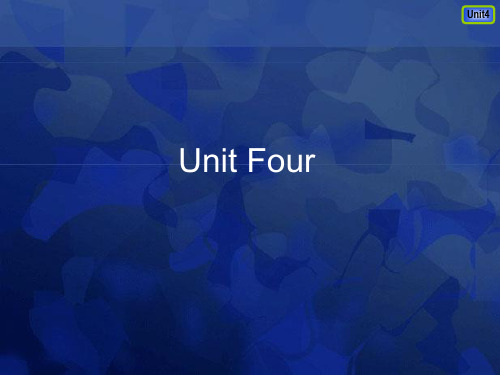
Unit4
Unit Four
Language Structure
See the following sentences and pay attention to the grammar rules they use:
Unit4
1. I would have liked to sign up, but I sprained my ankle.
Unit4
Practice: 3. needn't + perfect infinitive, indicating something that was unnecessarily done in the past. 1) I wrote a summary in more than five hundred words. But the teacher only asked for 200 words. Response: I needn't have written such a long summary. 2) Lin answered all the ten questions in the test paper. But we were only required to answer eight of them. Response: Lin needn't have answered all the ten questions in the test paper. 3) Mary went to the station an hour before the train started. Response: Mary needn't have gone to the station so early.
新编英语教程 unit 4

unit 4
Text I A Man from Stratford – William Shakespeare
Background Information
Vocabulary
Structure
Questions
Text 1: A Man from Stratfor d – William Shakespe are
3 To plot Shakespeare's life is to become involved in a kind of detective story where there are plenty of clues but very little else. Nobody even knows the exact date of his birth, although the register of the Parish Church confirms that William Shakespeare was baptized there on April 26th, 1564. Nor can it be proved that he went to the excellent local grammar school, although he probably did as there was nowhere else for him to go. At the age of 18 he married Anne Hathaway, a woman eight years older than himself, and they had three children. Then in 1585 this young married man apparently left Stratford and his family, for there is absolutely no record of him for seven
全新版大学英语单词详解 Book2 Unit4

Unit 4 The Virtual WorldText A A Virtual Life1.(标题) virtual: adj.1) created and existing only in a computer*I can visit a virtual store and put what I want in my basket at the click of a mouse button.*Some people spend too much time escaping from reality into the virtual world conjured up on their computer screens.2) almost what is stated; in fact though not in name*The officials hear this kind of talk in virtual silence.*国王处处都受王后的影响,以至于王后成了国家实际上的统治者。
(=The king was so much under the influence of his wife that she was the virtual ruler of the country.)2.(L. 2) interpret: v.1) understand (sth. said, ordered, or done)*The gift is generally interpreted as a bribe.*She made a gesture, which he chose to interpret as an invitation.2) give or provide the meaning of, explain诗有助于阐述人生的意义。
(=Poetry helps to interpret life.)*The evidence is difficult to interpret.3) translate what is said in one language into another(=No one in the tour group spoke Spanish so we had to ask the guide to interpret.)3.(L. 5) stretch: v. (cause to) become longer, wider, etc. without breaking*My wool coat stretched when I washed it.*The child stretched the rubber band to its full extent.*你已经使我忍无可忍了。
最新新编大学基础英语2 unit 4 教 案

A3: Because it can keep fit/ lose weight/ relax ourselves/ know a lot of friends/ effectively improve endurance/ exercise the ability to coordinate...
Step 2: Reading
A:Questions
Who founded the company?
When and where did the company start business?
What is the name of logo?
Which stars have worn it?
B: Phrases and Sentence structures:
板书设计:
Illustrations from left to right, and top to bottom
讨论、思考题、作业:
1.Interview:
What would be your ideal job?
Search adjs withthe jobs
2. Assign the exercise after the text.
I like to do_________
I like to _________
I like to go for a ____
Q2: How o week; Not very often; Every weekend; On Tuesdays after work; Every morning
Step 1: Speaking
Qs:1)How many sports brands/labels can you think of?
Book2Unit4教案

Book2Unit4教案澜沧拉祜族⾃治县第⼀中学教案课题:Unit 4 Wildlife Protection学科:英语年级:⾼⼀班级:195 ⼀、教材分析本课为⼈教版⾼中英语必修⼆第四单元阅读部分。
本单元的中⼼话题是“野⽣动物保护”。
涉及的内容包括濒临灭绝的野⽣动物的⽣存现状;我们要学会如何保护野⽣动物以及我们要从已经灭绝的的动物中吸取哪些经验教训从⽽促进我们保护野⽣动物的意识。
阅读(Reading)部分描述了Daisy在梦中经历的⼀次奇妙的飞毯旅⾏。
通过Daisy和藏羚⽺、⾮洲象、猴⼦的对话,学⽣进⼀步意识到野⽣动物的⽣存环境⽇益恶化以及保护野⽣动物的⾏动刻不容缓。
⼆、教学⽬标Teaching Aims: (教学⽬标)Knowledge aims: (知识⽬标)a. help Ss to understand and master the words and expressionsb. Let the students know some basic information about the endangered animals and wildlife situati on and protection. Ability aims: (能⼒⽬标)a. Encourage Ss to think and express their attitude towards the wildlife and the wildlife protection.b. Enhance Ss’ reading ability and develop Ss’ ability and skills of guessing words and reading co mprehension. Emotional aims: (情感⽬标)a. Help Ss understand the importance of the wildlife protection and make them be more active in t he helping wildlife.b. Develop Ss’ sense of cooperative learning.三、教学重点a. To train the reading comprehension to the whole passageb. To improve Ss’ ability of listening, speaking, reading and writing.四、教学难点Enhance the students reading skills in the passage.五、教学准备blackboard, books, and other normal teaching tools.六、教学过程1、导学案.Please translate the following sentences using the words or phrases in brackets.⑴有多少⼯⼈可能失业?(in danger of)⑵他戴着太阳镜以保护眼睛不受阳光的刺激。
- 1、下载文档前请自行甄别文档内容的完整性,平台不提供额外的编辑、内容补充、找答案等附加服务。
- 2、"仅部分预览"的文档,不可在线预览部分如存在完整性等问题,可反馈申请退款(可完整预览的文档不适用该条件!)。
- 3、如文档侵犯您的权益,请联系客服反馈,我们会尽快为您处理(人工客服工作时间:9:00-18:30)。
Unit 4Teaching objectives:1. To learn the main language structures (relative clause);2. To build language skills through dialogue and listening in & speaking out;3. To explore the theme of the text;4. To learn the key words and expressions;5. To appreciate the writing features of the text;6. To apply some reading skills to practice;7. To think critically about the theme.Teaching focuses:1. The relative clauses introduced by relative adverbs: when, where, why;2. Key words and expressions;3. Appreciation of the text.Teaching approaches:1. Task-Based Language Teaching;2. Student-Centered Class;3. Learning by Using.Time allocation:Language Structures (2 periods)Dialogue (2 periods)Listening in & speaking out (1 period)Reading 1 (4 periods)Reading 2 (2 periods)Guided writing (1 period)Workbook (2 periods)Teaching procedures:Part 1 Language structuresStep 1 Ask students to read the four sentences and try to find out the grammar point -----relative clauses introduced by relative adverbs: when, where, whyStep 2 Analyze the following sentences one by one and find out the focus of each sentence:1.12 October 1492 was the day when Columbus landed in America.The relative clause introduced by when2. A kitchenette is a small room where people cook their meals.The relative clause introduced by where3.I like the way she spoke.The relative clause preceded by the way (in which)4.Is that the reason why we have tests and quizzes all the time?The relative clause introduced by whyStep 3 Explanations of grammar points1. 关系副词or 关系代词先行词是表示时间或地点的名词时,并不都是用关系副词引导,而是要看关系词在从句中所作的成份。
作状语时,用关系副词;作宾语时,仍然要用关系代词。
a. She is going to spend the summer holidays in Qingdao, where she has some relatives.b. This is the place which I visited last year.c. Did you still remember the days when we spent together in Hainan?d. October 1st is the day which we Chinese people will never forget.2. 关系副词可代替的先行词是时间、地点或理由的名词,在从句中作状语。
A. when, where, why关系副词when, where, why的含义相当于“介词+ which”结构,因此常常和“介词+ which”结构交替使用,E.g. :a. There are occasions when (on which) one must yield.b. Beijing is the place where (in which) I was born.c. Is this the reason why (for which) he refused our offer?B. that代替关系副词that可以用于表示时间、地点、方式、理由的名词后取代when, where, why 和“介词+ which”引导的定语从句,在口语中that常被省略,E.g. :His father died the year (that / when / in which) he was born.He is unlikely to find the place (that / where / in which) he lived forty years ago.Step 4 Presentation of language structure practiceAnswer the following questions according to the following directions.1. to elicit relative clauses introduced by when, e.g.,1) What is significant about the year 1949?It was the year when the People’s Republic of China was founded.2) What is significant about the year 1919?It was the year when the May the Fourth Movement took place.3) What sort of days are gone forever for the Chinese people?Gone forever are the days when the Chinese people were oppressed and exploited.4) What is the most memorable day in your life?It is the day when______________________.2. to elicit relative clauses introduced by where, e.g.,1) What is a dining-car?It is a railway coach where meals are served.2) What is a reference-room / library / cinema / theatre / university / language lab / (any other place which can be identified by a relative clause)?Step 5 Listen and practice according to the cues.Ask the students to practice the conversations in pairs.Part 2 DialogueStep 1Lead inAnswer the following questions:➢Have you ever had any recurring dreams?➢How can you interpret your dreams?➢Do you think dreams are closely related to our desires?➢Do you believe that it will be very helpful to our health if we can make good use of dreams?Step 2 Background information1.Psychoanalytic dream interpretationPsychoanalytic dream interpretation is a subdivision of dream interpretation as well as a subdivision of psychoanalysis pioneered by Sigmund Freud in the early twentieth century. Psychoanalytic dream interpretation is the process of explaining the meaning of the way the unconscious thoughts and emotions are processed in the mind during sleep.There have been multiple methods used in psychoanalytic dream interpretation, including Freud's method of dream interpretation, the symbolic method, and the decoding method解码. The Freudian method is the most prominently used in psychoanalysis and has been for the last century. Psychoanalytic dream interpretation is used mainly for therapeutic purposes in a variety of settings. Although these theories are used, none have been solidly proven and much has been left open to debate among researchers. Some studies have shown that areas of dream interpretation can be invalid无效的and therefore a decline in importance has been seen in psychoanalytic dream interpretation.2.Id, ego and super-egoId, ego and super-ego are the three parts of the psychic apparatus defined by Sigmund; they are the three theoretical constructs in terms of whose activity and interaction mental life is described. According to this model of the psyche, the id is the set of uncoordinated instinctual trends; the super-ego plays the critical and moralizing role; and the ego is the organized, realistic part that mediates between the desires of the id and the super-ego. The super-ego can stop you from doing certain things that your id may want you to do.Step 3 Listening to the recording and answer the questions on specific details of this dialogue1) Who are the two speakers?2) What topic are they talking about?3) What does the dream of driving in or falling in water indicate?4) What is the relationship between work and dream?5) Why do people seldom remember their dreams?start off by — If you start off by doing something, you do it as the first part of an activity.be of use — be useful. Here are more examples for the pattern:be of difficulty, which means “be difficult”be of great importance, which means “be very important”recur: v. happen again or repeatedly 重现e.g. This is a problem which will constantly recur and entail the same consequences.Our first encounter often recurs to my mind.Collocations: a recurring problem, error, illness 反复出现的问题、错误、疾病;recur to sb. 事情在头脑中重现Translation:当我听到这柔和的音乐时,童年时的美好回忆便浮现在我的脑海中。
